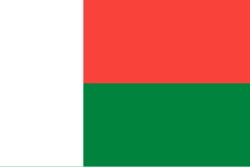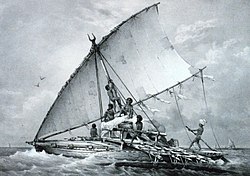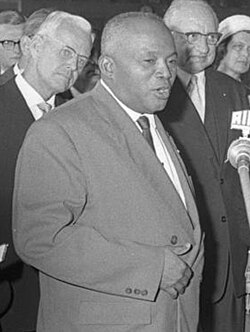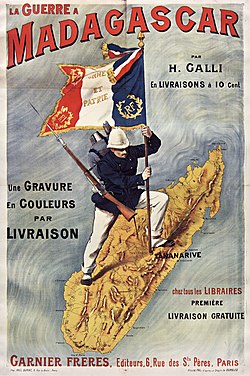Portal:Madagascar
Madagascar, officially the Republic of Madagascar, is an island country that includes the island of Madagascar and numerous smaller peripheral islands. Lying off the southeastern coast of Africa, it is the world's fourth largest island (after Greenland, New Guinea, and Borneo), the second-largest island country (after Indonesia), and the 46th largest country overall. Its capital and largest city is Antananarivo. Following the prehistoric breakup of the supercontinent Gondwana, Madagascar split from Africa during the Early Jurassic period, around 180 million years ago, and separated from the Indian subcontinent approximately 90 million years ago. This isolation allowed native plants and animals to evolve in relative seclusion; as a result, Madagascar is a biodiversity hotspot and one of the world's 17 megadiverse countries, with over 90% of its wildlife being endemic. The island has a subtropical to tropical maritime climate. Madagascar was first permanently settled during or before the mid-first millennium AD by Austronesian peoples, presumably arriving on outrigger canoes from present-day Indonesia. These were joined around the ninth century AD by Bantu groups crossing the Mozambique Channel from East Africa. Other groups continued to settle on Madagascar over time, each one making lasting contributions to Malagasy cultural life. Consequently, there are 18 or more classified peoples of Madagascar, the most numerous being the Merina of the central highlands. Until the late 18th century, the island of Madagascar was ruled by a fragmented assortment of shifting sociopolitical alliances. Beginning in the early 19th century, most of it was united and ruled as the Kingdom of Madagascar by a series of Merina nobles. The monarchy was ended in 1897 by the annexation by France, from which Madagascar gained independence in 1960. The country has since undergone four major constitutional periods, termed republics, and has been governed as a constitutional democracy since 1992. Following a political crisis and military coup in 2009, Madagascar underwent a protracted transition towards its fourth and current republic, with constitutional governance being restored in January 2014. (Full article...) This is a Featured article, which represents some of the best content on English Wikipedia..
Eusèbe Jaojoby (born 29 July 1955), commonly known by his surname Jaojoby [ˈdzodzubʲ], is a Malagasy composer and singer of salegy, a musical style of northwestern Madagascar. Critics consider him to be one of the originators of the modern salegy style that emerged in the 1970s, and credit him with transforming the genre from an obscure regional musical tradition into one of national and international popularity. Jaojoby also contributed to the creation of two salegy subgenres, malessa and baoenjy. Jaojoby has been called the most popular singer in Madagascar and the Indian Ocean islands, and is widely referred to as the "King of Salegy". His success has earned him such honors as Artist of the Year in Madagascar for two consecutive years (1998–1999) and the role of Goodwill Ambassador for the United Nations Population Fund in 1999. In 1970 Jaojoby began singing in the northern coastal town of Diego-Suarez. He performed with bands that were experimentally blending American soul and funk with the Malagasy musical traditions of the region. The artist gained popularity and toured regionally, producing four singles with The Players before the band broke up in 1979. After a short break in the 1980s to pursue a career in journalism, Jaojoby resumed his musical career and rose to national prominence with his 1988 hit "Samy Mandeha Samy Mitady". He then reoriented his career toward music, recording his first full-length album in 1992 and becoming a full-time professional musician the following year. He has since released eight full-length albums and has toured extensively in Madagascar and abroad accompanied by his wife and adult children, who perform in the band with him. (Full article...)  Madagascar, then officially known as French Madagascar, was a French colony at the outbreak of the Second World War, having been under French administration since 1885. It played an important role in the war due to the presence of critically important harbors, the contribution of Malagasy troops, and was also the scene of fighting between Allied and Vichy French forces in 1942. After the fall of France in 1940, Madagascar became a crucial flashpoint in contention between the Free French movement and Vichy France. The island was also consequential in the Pacific theater of the war as Imperial Japanese naval forces operated unopposed off the island for some time. In 1942, the British and several other Allied forces launched an invasion of Madagascar, seeking to protect its position as an important juncture in Allied shipping and deny its use to the Axis. In addition to its role as a key link in the Allied supply lines and major provider of troops, Madagascar was also briefly considered as the solution to the Jewish Question by the government of Nazi Germany who openly floated deporting Europe's Jewish population to the island in 1940. This scheme known as the Madagascar Plan never came to fruition because of the British takeover. The island was officially handed over from the British to Free France in 1943 under whose control it remained for the remainder of the war. (Full article...) This is a Good article, an article that meets a core set of high editorial standards.
 Three Horses Beer (better known locally as THB) is a pale lager that has been brewed by Star Breweries of Madagascar since 1958. It is the highest-selling beer in Madagascar and has been described as emblematic of the country. THB is sold nationwide and, since 2005, has been exported to such markets as France, Reunion Island, Comoros, and Mayotte. The Malagasy beer is produced at two breweries in Madagascar, the first centrally located in Antsirabe and the other in the northern city of Antsiranana. THB Pilsener, the most common variant of THB, has a light taste and is produced from mostly local barley, corn, and hops. Star Breweries also produces THB Fresh (a shandy with less than 1% alcohol), THB Special (6.2% alcohol), and THB Lite (1% alcohol). Recent investments in Star Brewery infrastructure have allowed a 20% increase in production since 2011. After advertising alcohol in the media was banned under former President of Madagascar Marc Ravalomanana, Star Breweries has increasingly promoted THB through unconventional means. These have included sponsoring the THB Champions League, Madagascar's national football championship, and holding annual beer festivals. In addition, THB is a regular sponsor of local musicians through major annual festivals and tours. Star Breweries has also hired musicians to perform in music videos created to promote the beer. In 2014 the THB label was significantly redesigned, and in 2015, a new slogan, "THB eo foana e!" ("THB always!"), was promoted alongside the beer's longstanding trademark Soa Ny Fiarahantsika ("The Pleasure of Being Together"). Malagasy musical stars and other public figures regularly promote the beer. (Full article...) The following are images from various Madagascar-related articles on Wikipedia.
Landscape near Fianarantsoa, Madagascar.
The following Wikimedia Foundation sister projects provide more on this subject:
Discover Wikipedia using portals | |||











































































